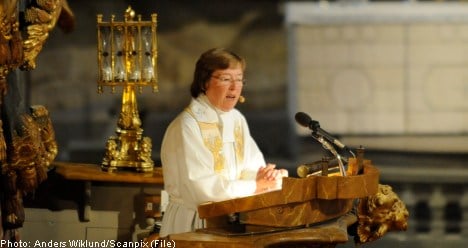The Local: What is this election about? What is the key question facing Swedish voters?
Bodil Ceballos: The most important issue is climate change. We want votes from voters to be based on not only what they keep in their pocket at the end of the month, but what they get at the end of four years. For us, it’s important to make people think about the future and not only their own finances in the short-term.
It is also important to talk about jobs. We agree with our Red-Green partners, the Social Democrats and Left Party, that those who earn 40,000 kronor and more a month can pay more taxes. It is either a system based on egoism or a system based on solidarity.
TL: What does your party propose to do about these issues?
BC: What we will try to do is mix the climate with jobs so we can work on both at the same time. We want to invest heavily in infrastructure for buses, trains and insulating old buildings that use too much energy, to and build a network of alternative fuels that reaches the whole country.
We also want to invest in letting people buy organically and locally produced products through favourable policies for small enterprises.
We want to raise taxes on what is bad for the environment and make things that are better for the environment cheaper. We want to make fossil fuels more expensive than ethanol and biogas so people can choose what is less expensive over fossil fuels.
We also want to create as many jobs as possible by lowering emissions. We want to restore homes from the 1960s and 1970s that are badly insulated and use mostly electricity. Insulating houses can create a lot of jobs and will result in more money in people’s pockets.
We will also work to reduce fossil fuels for heating and use more alternative energies which will also create more new jobs. We also want to push for the construction of new rail lines to encourage people to take the train instead of driving their cars.
We will also invest in the public sector to hire more teachers, care workers and hospital staff.
TL: What does your party see as the key to helping non-Swedes successfully establish themselves in Sweden?
BC: We propose immigrants find a job while studying Swedish. We learn Swedish in very different ways. Traditionally, it has been learn first, then find a job. For some people, it is good, but others learn on the job.
More flexibility is needed to get the best support. In some municipalities, it is already like that, like in my own [Gävleborg county north of Uppsala]. We give immigrants the opportunity to work and study at the same time.
TL: What do you say to foreign students who come here to study, but find it hard to find a job?
BC: It is very important to get people from other countries to stay after they study here. There will be a big need for immigration into the country in the future. This is an opportunity for us to make them feel welcome in the country.
No one has thought of the difficulty of getting foreign students work, no party has. Swedish students get loans. We don’t want our own students to have to work at the same time and to instead dedicate their time to studying.
What we don’t want are student fees that the government will impose on foreign students. We want to eliminate the fees.
Foreign students need a work permit to find a job obviously and that is an issue we’ve brought up. However, even if they get a work permit, it is difficult for young people to find jobs in general in Sweden right now, so we want to try make it easier for all of them by using taxes that employers pay to help those who are out of work.
TL: What is your party’s top foreign policy issue?
BC: On climate change, there was no agreement in Copenhagen and they are working hard to reach an agreement in Cancun. We are coming together to call on countries to diminish emissions and discuss adaptation and mitigation. We want a better climate for our children in the future.
To return to the election guide main page, click here.


 Please whitelist us to continue reading.
Please whitelist us to continue reading.
Member comments